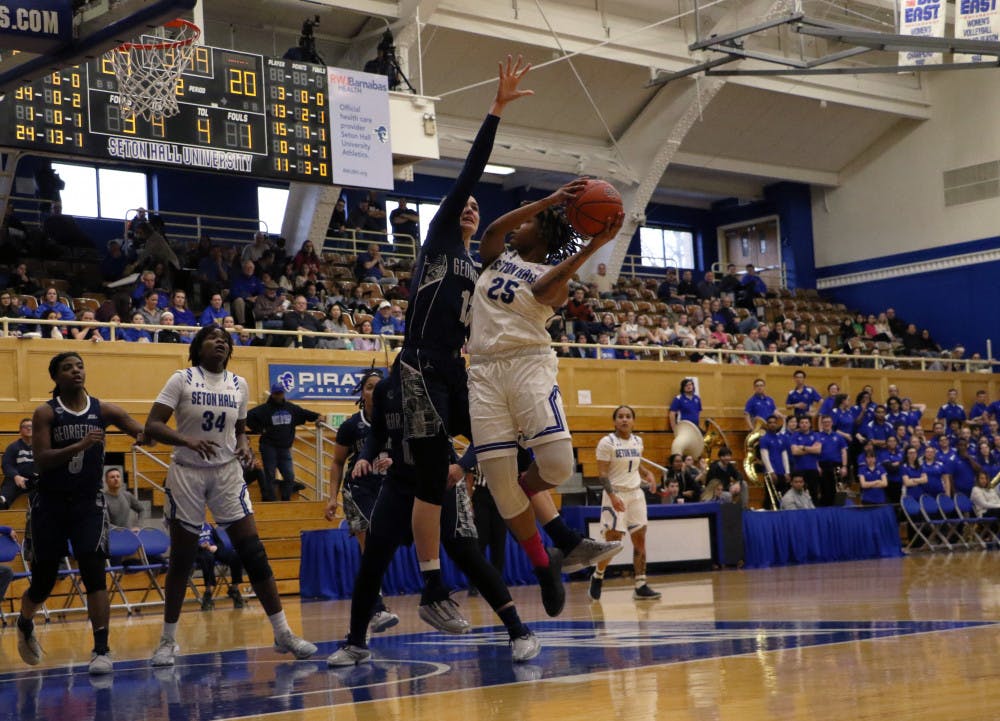University administrators have spoken out against sexually explicit images that have been posted and distributed digitally by Seton Hall students.
According to Dr. Tracy Gottlieb, vice president of student services, Seton Hall's current moral dilemma is comparable to the Tyler Clementi case at neighboring Rutgers, as well as the scandal Penn State faced two years ago.
According to Gottlieb and Karen Van Norman, dean of students and community development, students must decide to stop this behavior on their own by having the courage to stand up against the culture of sending and posting embarrassing material.
Gottlieb and Van Norman said they hope that students take action and put an end to this behavior and understand that in this day and age, anyone can record what students are doing, at parties or anywhere else.
"This is not blaming the victim but it's saying that students who go and go to parties have to realize that there is a very good chance that somebody is watching what they're doing and that somebody would like to embarrass them," Gottlieb said.
"Students aren't thinking about the ramifications of posting material that's embarrassing or upsetting, and I'm upset about that because we are only three years past the Tyler Clementi incident at Rutgers where somebody thought they were being funny and the end result was somebody was dead," Gottlieb said.
Gottlieb continued, "I keep thinking of Penn State, where people didn't say anything, even though it assaulted their own personal sense of right and wrong."
According to Van Norman, this is a matter of human decency and respect and goes beyond any rule or regulation at the University.
"There's no University rule or regulation that could ever be more powerful than a sense of decency," Van Norman said.
"It's knowing that we can make a thousand little choices in the course of a day and some of those choices have big repercussions," Van Norman said, "[It's] having enough respect for ourselves and each other that this just doesn't happen."
Gottlieb said: "Part of the issue that we're talking about here is very fundamental principle of civility ... and then beyond that there's the ... issue of people not realizing that they could be ruining their own lives, and they could be ruining somebody else's life for something that's a passing joke."
In the event that student athletes are involved in situations on campus, off campus or digitally, the Athletic department would take action based on the code of conduct for athletes, according to Director of Athletics Pat Lyons.
"Whether you're a student athlete or just a student we expect you to follow certain codes of conduct," Lyons said. "Unfortunately the world is so much different than when I was an athlete."
"It's not just when they step on campus," Lyons said.
"We expect athletes to represent themselves, the campus, their family on campus or off and so that's how we view it and if they do something on social media, something that's brought to our attention ... we take action."
Students may be unaware of the legal ramifications of participating in this behavior.
It is potentially illegal under both criminal and civil law in New Jersey to take and distribute images of a sexual nature without consent.
A text message of these images could potentially land the photographer and any senders of sexual images without consent in a courtroom, with penalties that include fines and jail time.
It is a criminal offense to "knowingly observe, videotape, and/or disclose the images of a person engaged in sexual intercourse without consent," according to a New Jersey criminal statute.
It is a crime of the fourth degree (imprisonment for 18 months or less) for a person to "knowingly observe another expose intimate parts, engage in sexual contact or sexual penetration without consent."
It is a crime of the third degree (imprisonment from three to five years) if a person knowingly "photographs, films, videotapes, records or otherwise reproduces in any manner" the image of another engaging in sexual contact or penetration.
However, the victim must be in a place where privacy is reasonably expected for both of these sections of the statute to be applicable.
A third section of the criminal statute makes it a crime of the third degree and a possible fine of $30,000 for anyone convicted of disclosure in a situation where privacy may or may not be expected.
Disclosure means to "sell, manufacture, give, provide, lend, trade, mail, deliver, transfer, publish, distribute, circulate, disseminate, present, exhibit, advertise or offer" the images.
According to a New Jersey civil statute, a victim may recover monetary damages from a person who, "without consent, reproduces and/or discloses images of the victim's intimate parts or images of the victim engaged in sexual penetration or contact."
Therefore, any person who videotapes or distributes the images of another person engaging in sexual intercourse may be in violation of the civil statute.
Charlotte Lewis can be reached at charlotte.lewis@student.shu.edu.
Ashley Duvall can be reached at ashley.duvall@student.shu.edu.
T.J. Brennan can be reached at thomas.brennan@student.shu.edu.





